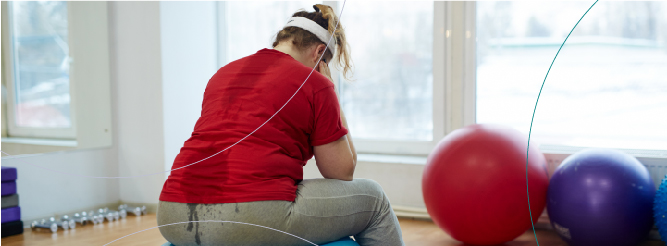
Sometimes, the hardest part about working out is actually starting. Whether it’s at home or at the gym, we can always come up with different excuses that just stall our fitness journey. So once we decide to let go of those excuses and actually put in the work, it feels like the first win of many to come. However, one of the first hurdles we must overcome to fully integrate exercise into our daily routine and achieve your goals is to accept that quick results are not easy to come by.
Frustration is one of the main reasons why people tend to quit exercising because their expectations are too high and their patience too low. There are several ways to overcome this frustration and power through the first few weeks until we’re comfortable and happy enough with the workout we’ve chosen. Some of them include actually finding an exercise that suits our lifestyle and helps us achieve our goals, meeting people who are on similar workout journeys that can motivate you and give feedback, and consistency in your week’s workouts.
However, there’s a bit of a catch. Just because you exercise doesn’t mean that you’ll get the results that you want and it’s important that if you have a specific goal in mind, you research about the types of workouts that can help you achieve what you’re looking for. It can be extremely disappointing to invest your time and energy into a workout and see no results in return, so for this article we’ll go over some of the reasons why you’re not achieving what you want despite putting in the work.
At LIMARP®, we care about overall health and wellness, and in the case you’re recovering from bariatric surgery, we want to ensure that you maintain your current weight and form by following an effective workout plan. There are many factors that may influence why you’re not seeing results and if you think it may be health related, we invite you to call us and schedule an appointment with one of our doctors. They will go over your medical history and order some tests to confirm or discard any ailments that may be hindering your workout progress.
Keep in mind that the following reasons we’re going to list are mainly general and if you have other conditions, such as hypothyroidism, it’s important that you contact your doctor to see what can be done that’ll help you see results from your workouts.
Reasons Why You’re Not Seeing Results
Before listing some of the reasons you’re not meeting your goals despite trying different workouts, it’s important to point out that every person’s timeline is different and it may depend on their genetics, their fitness level, type of workout, diet, and overall consistency. The average time it takes for a person to see noticeable results from their workout is around 8 to 12 weeks; if more time passes and you’re not seeing any difference, or worse, are experiencing setbacks, these may be some of the reasons why.
You don’t have a clear goal.
Be realistic about your goals and look for a workout plan that makes them attainable. It’s good to start with short-term goals, such as doing a single squat with good form, before trying to complete harder workouts your body may not be prepared for. Everyone starts as a beginner and being patient with yourself is one of the first steps to achieving greater endurance and strength. If you’re attending a gym, we recommend you speak to the certified trainers available, they can help you establish a plan that can progressively become harder once you start meeting certain goals.
You’re stuck on the same exercises.
Repeating the same exercises over and over again will hinder your progress because you’re not challenging your body. Plateauing can also lead you to lose motivation and the best way to avoid it is to switch it up a bit. For example, if you mostly do cardio workouts, dedicate a day to strength training or brand new activities that challenge you.
Your workouts aren’t progressive.
Similar to the previous point, not being progressive with your workouts will cause you to plateau. What does this mean? Once an exercise becomes easier, you have to amp it up by increasing the amount of weight you lift or the reps you can complete; you can increase the speed on the treadmill or run an extra mile. The point is to push your body to work harder and smarter without injuring yourself in order to see results and continue building your endurance and strength.
Your diet doesn’t match your workout.
How well you eat can be a determining factor for a plethora of things and it can also influence the results you obtain from your workout. What you eat and your fitness goals go hand-in-hand, meaning that if there’s not a good balance between them, you may not see the results you want. For example, if you’re looking to lose weight, you should cut back on certain food groups or processed food to not surpass the amount of calories in your diet; on the other hand, if you want to increase muscle, you need to have a high protein intake.
The amount of calories you should consume daily depends on the type of workout you’re practicing. If you’re starting your fitness journey, we recommend you talk to a licensed dietitian so that they can create a nutritional plan that fits your workout routine and body composition goals. They will probably recommend that you cut back on processed foods that mainly contain empty calories and to focus on meals made of whole foods.
There are also several supplements you can take if you struggle to meet your daily portions, but it’s important that you discuss them with your doctor first before incorporating them into your diet.
You’re not getting enough rest.
When it comes to working out, sometimes less is more. This means that you need rest days in your week so that you body can recover, especially if your workout is demanding. It’s recommended that you have at least one rest day to avoid burnout. It’s always better to save your energy and avoid exhaustion because not only are you hindering your results, but you’re risking injury.
Keep in mind that not exercising doesn’t mean you’re not active. You can use those days to do more light workouts, such as walking, stretching, or yoga.
Sleep is important.
Not getting enough sleep can affect you in several ways, such as decreasing your concentration and dampening your mood. But did you know that being sleep deprived can also impact how your workout results? Your lack of energy can drive you to unusual snacking habits, like consuming food that’s high on sugar and fat for a quick pick me up. It can also slow down your metabolism and reduce your energy levels to the point that you won’t be able to work out.
To improve your sleeping schedule, you can establish a bedtime ritual to relax, put your phone on Do Not Disturb or Sleep mode, and avoid any food or drinks with caffeine before going to bed.
Cut back on the alcohol.
Although some types of beer are often advertised as low-calorie, it doesn’t mean that they’ll help you lose weight. In fact, the calories that beer has are empty calories, which are those that you can’t turn into energy once you burn them. As with food, moderation is key and heavy drinking, besides being linked to weight gain, can also bring other serious conditions that can harm your health.
A medical condition may be hindering your progress.
Several medical conditions may be preventing you from seeing results, so if you’re carrying out a workout and realize you’re gaining weight, these conditions might be some of the causes. Some examples are hypothyroidism, polycystic ovarian syndrome, or sleep apnea.
If you think you’re suffering from any of these conditions or want to confirm if they’re the reason why you’re not seeing results, speak with your doctor. They’ll review your case and order some tests. Once they confirm the cause, they can discuss your options with you to ensure that you get the results you want and meet your goals in a healthy and safe way.
These are just some reasons that may explain why you’re not seeing results or meeting your weightloss goals. Almost all of them can be solved by talking to professionals that can guide you in getting the most out of your diet or workout routines. It’s important to remain motivated and enjoy exercise to avoid becoming disheartened with this aspect of your lifestyle; being active is good for your health, but physically and mentally, so we encourage you to find the workout that’s best for you.
Contact Us to Learn More
If you’re working out and seeing no results, schedule an appointment with one of our doctors. We can help determine the right treatment for you. Contact us online anytime or give us a call at (619) 373-0229.


